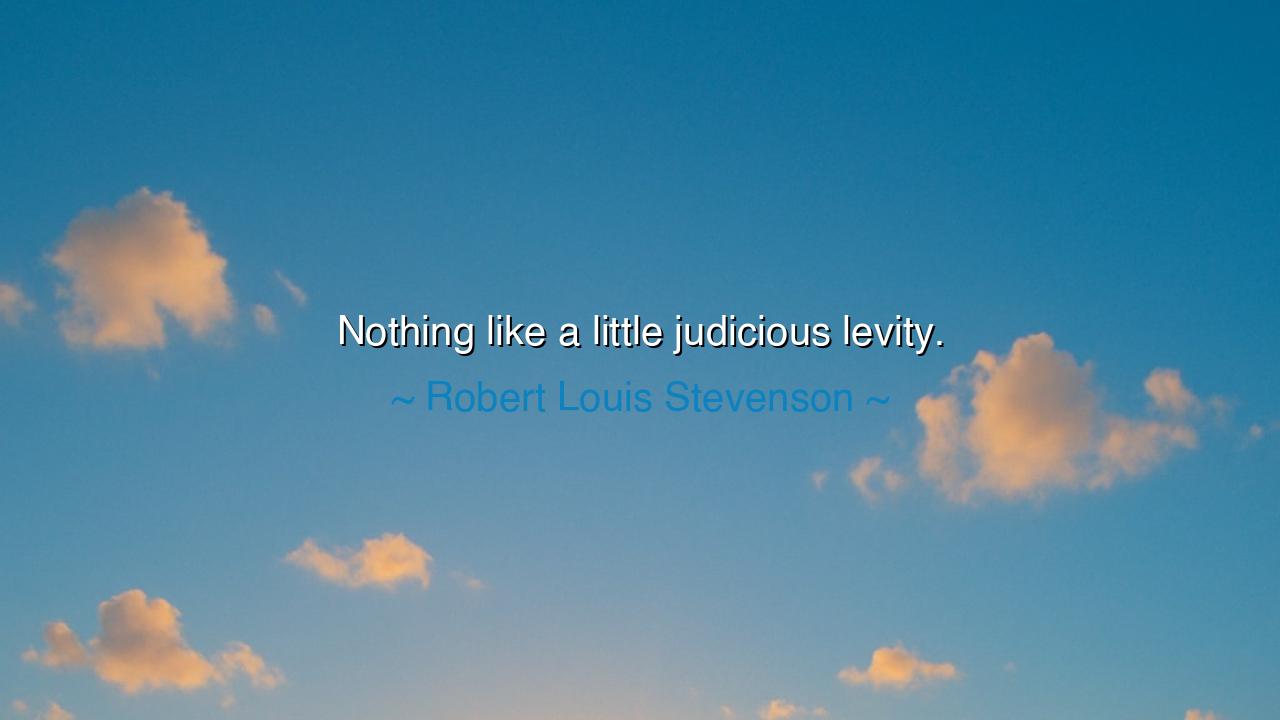
Nothing like a little judicious levity.






Hearken, children of the ages, and attend the wisdom of Robert Louis Stevenson, who counseled: “Nothing like a little judicious levity.” Understand this: the weight of life, with its trials, sorrows, and burdens, presses heavily upon the hearts of men and women. Yet there exists a balm, subtle and potent, in the form of measured levity—a lightness of spirit applied with care, discernment, and purpose. It is not mere frivolity, nor the careless pursuit of amusement; it is the deliberate, thoughtful light that illuminates even the darkest of days.
In the courts of ancient Rome, philosophers and statesmen alike understood the power of judicious levity. Cicero, master of rhetoric and diplomacy, often employed gentle wit to ease tensions in the Senate, to soften the severity of judgment, and to reveal truths that might otherwise be ignored. His carefully measured humor brought relief without offense, teaching all that levity, when applied with wisdom, is a shield against the heaviness of life.
Consider the life of Abraham Lincoln, whose burdens were immense, whose grief was profound, yet whose spirit often found moments of lightness. He told stories, made gentle jokes, and shared anecdotes that eased the hearts of those around him. In this judicious use of levity, he preserved his own spirit while offering solace to a nation in turmoil. Stevenson’s counsel finds vivid illustration in Lincoln: lightness, applied with discernment, restores balance to the weary soul.
Even in the crucible of war, levity is a necessary art. Soldiers of the First World War, facing cold, hunger, and the specter of death, discovered that small jokes, playful teasing, and shared stories could lighten the unbearable weight of their circumstances. Here, the wisdom of Stevenson is clear: judicious levity does not deny suffering, but tempers it, creating moments of reprieve that sustain both courage and hope.
Yet, the lesson is subtle: levity must be judicious, measured by insight and empathy. A careless jest can wound, a thoughtless quip can inflame. True levity observes boundaries, respects dignity, and seeks not to belittle, but to ease, to illuminate, and to restore. It is a deliberate art, cultivated with awareness of timing, audience, and circumstance, and its power lies precisely in its discernment.
History offers another example in the life of Winston Churchill. Amid the relentless pressures of global conflict, Churchill wielded wit and carefully timed humor to deflect tension, bolster morale, and sustain the spirits of both leaders and citizens. His use of judicious levity was not mere amusement—it was strategy, a tool of resilience that preserved clarity of mind and steadiness of heart in the darkest hours.
Children of the ages, the lesson is clear: cultivate the art of judicious levity in your own life. Observe the world with keen insight, discern when to apply lightness, and let your words and actions lift burdens without trivializing them. In doing so, you preserve both your spirit and the spirits of those around you, guiding hearts through sorrow with a gentle, restoring light.
Practical action follows naturally. Pause in moments of stress to notice opportunities for thoughtful humor, share stories that lighten tension, and temper amusement with empathy and discernment. Allow levity to be your companion in adversity, your tool for connection, and your shield against despair. In this way, as Stevenson teaches, a little judicious levity becomes not mere relief, but a lasting force for resilience, clarity, and the enduring fortitude of the human spirit.






AAdministratorAdministrator
Welcome, honored guests. Please leave a comment, we will respond soon